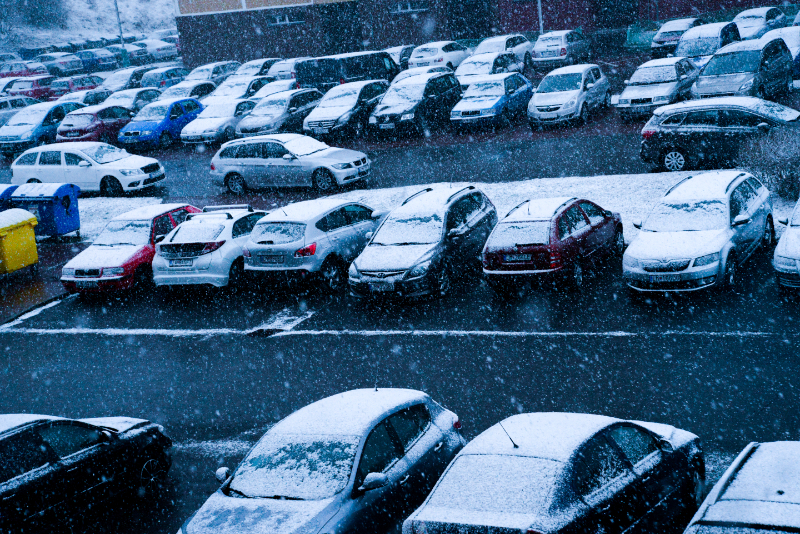
Winter Gritting Specialist
Our pavement and driveways may need a good clearing out in the morning hours. It's recommended to keep an eye on the daily weather forecast, but it provides little practicality in ice conditions. Ice forming around a vehicle and especially on motorways can be hard to handle without gritting involved.
Rock salt is a popular method to melt ice, but it can be a little too late for commuters because of traffic build-up. Snow ploughs are typically used to clear any snow or ice build-up. Spreading rock salt is more effective during the snowfall to clear the roads; thus, it's important to plan ahead of snowfall.
Grit and Salt Spreading in aberdeen
In the event ice, frost or snow is forecast, gritting should be done or when pavements are likely to get wet or damp; and also when floor temperature levels are at or below freezing point. The best time to do this is either early in the morning just before employees arrive or early in the evening before the frost settles. It's important to remember that salt does not instantaneously work since it requires adequate time to dissolve into the moisture on the floor.
It's not recommended to carry out gritting while it is raining, as it washes away the salt and can become problematic if the rain later turns to snow. Once the accumulated snow compacts and turns to ice, it is challenging to treat it efficiently using grit, which is typically used to provide traction to vehicles and pedestrians to minimise the risk of slips and falls. We are the leading company providing salt spreading in Aberdeenshire.
Snow Clearing Aberdeen offer private road gritting and winter maintenance throughout Aberdeen, Dundee and Peterhead.
Ensuring Employee Safety with Annual Winter Road Gritting Services
Safety is one of our primary concerns. With our experience in winter snowstorms, it's good to call on those who know. Even more so is having the right equipment to get the job done when needed, especially in emergencies.
At Snow Clearing Aberdeen, we understand the importance of keeping roads and paths safe during the winter months. Our annual winter road gritting services are designed to prevent accidents by reducing ice and snow buildup. This helps ensure the safety of road workers who are maintaining the roads, and commuting employees who rely on these roads to get to and from work. Safer roads mean fewer delays and accidents.
Operating seven days a week, our team of local specialists ensures that your roads are safe and clear, even overnight. We'll keep your employees’ commute worry-free and secure throughout Aberdeen, Dundee, Peterhead, and the North of Scotland.
Private Road Gritting North Scotland
Are you looking for private road gritting services in Aberdeen. Our road gritting service provides protection against ice and snow over the winter months.
Morning winter blasts can be dreary when you live in a region susceptible to snowfall; especially when you have a morning commute. Icy road conditions causes a sharp increase in the rate of accidents on the roads, leading to expensive repair costs and personal injury.
We offer private gritting and snow removal for the following industries:
Private Shops
Industrial Estates
Service Yards
Retail Parks
Hotels
Car Parks
Supermarkets
Private Roads

Frequently asked questions about commercial road gritting
We know many of you may have questions about commercial road gritting. Our FAQ section is designed to provide clear and concise answers to common queries. From understanding the benefits of regular gritting to knowing how our services operate overnight, we aim to cover all essential information. Your safety and satisfaction are our biggest priorities.
This is one of the most commonly asked questions received by our team; the answer is no, salt cannot melt ice at any temperature. Rock salt is most effective at 8 degrees Celsius and over and starts becoming less effective when temperatures are below -5 degrees Celsius. Finally, safety is one of our primary concerns. With our experience in winter snowstorms, it's good to call on those who know. Even more so is having the right equipment to get the job done when needed, especially in emergencies.
It is always highly recommended to grit before the snow falls. This helps prevent the build-up of icy surfaces and keeps pedestrians off slippery areas. Grit or salt should be spread in zones that are susceptible to frost or ice.
To ensure the effectiveness of gritting, it is essential to know the correct amount to spread based on the severity of the weather conditions. The amount of grit needed varies according to the type of frost or ice.
For light frost, a small amount of grit, approximately 15 grams per square metre, is sufficient. This helps to prevent thin layers of ice from forming, keeping the surface safe for pedestrians and vehicles.
In the case of heavy frost or ice, a higher quantity is required. Spreading around 25 grams per square metre provides better coverage and helps to melt the thicker ice layers, reducing the risk of accidents.
For severe ice or snow, the heaviest application is necessary. Using 35 grams of grit per square metre ensures that the thickest ice and snow are managed effectively, making the area safer for everyone. By adjusting the amount of grit according to these guidelines, you can maintain safer walking and driving conditions during winter weather.
Gritters will usually treat the roads overnight before the temperature dips below freezing. Roads are less busy in the evening and early morning hours so the gritters can work more effectively. You should expect to see the gritters on the road between 7pm and 4am.
The only exception to this is if snow is forecast before 7pm as the gritters will try and get out before the snow starts to fall. This will usually be done before the evening rush hour. If you live in a large county, you may find that different decisions are made for different regions as the weather conditions may differ.
Even if gritting has taken place, there may still be ice on the roads. If the forecast changes quickly then ice may have started to form before the gritters have gone out.
If the weather is wet, then there is no point sending gritters out because any salt that is laid will just be washed away. Grit salt also becomes ineffective when the temperature falls below -5 degrees Celsius.
When the gritter is spreading salt on the ice over the road, it will not melt the snow automatically. De-icing is a chemical process which takes time; the salt will begin to work once it is distributed over the roads by the cars and other vehicles. Salt spreading is the beginning step followed by traffic "moving the salt" naturally. This also means that roads with light traffic may still be icy after being salted.
Once the salt is spread, it can melt the snow effectively if it's less than 40mm deep, allowing for the traffic to do the rest. Our team typically ploughs fresh snow to 40mm in depth before spreading salt to work it in and melt to snow.
The decision about whether to grit the roads is made on a daily basis. It is the temperature of the road surface which determines the necessity for grit spreading. Gritting is generally carried out when road temperatures are less than 1 degrees Celsius, with ice being forecast.
Snow Clearing Aberdeen offers a private gritting service for your car park or private roads when the temperature makes it unsafe. Ask us about a scheduled de-icing service or a pay as you go package. We cover across Aberdeen and the surrounding areas to offer a reliable salt and grit spreading service.
Snow Clearing Aberdeen offer ice gritting services throughout Aberdeen, Dundee and Peterhead.
our winter services we provide
Are you looking for commercial road gritting contractors in North Scotland? We offer private hire gritting services, snow removal and winter maintenance for Aberdeen, Dundee and Peterhead.
our decision making process
At our company, we make careful decisions to ensure effective gritting and snow clearing. We closely monitor weather forecasts and road surface temperatures in your area. When temperatures drop below zero, we promptly spread grit and salt to keep roads safe.
Weather Predicting
Using an elaborate weather forecast, we monitor road surface temperatures closely in your area. If this falls below zero, then we will arrange to spread grit and salt.
All Basis Covered
Fitted on our gritters are PDAs and GPS trackers which provide us with a timestamp and date while on site.
Information concerning the site's access, weather and ground conditions are recorded upon arrival; if any area is not gritted (for instance, parked vehicles in the way), data is also recorded.

Constant Communication
In the afternoon, generally around 4PM, we send an email notifying you that gritting will be carried out that night. Snow clearing is usually done early in the morning before your indicated time and overnight.
Evidence Provided
Upon the completion of the job, a completed job card is instantly sent to your e-mail.
This information is crucial since it is evidence that the gritting timings and treatments were done if a trip, slip, or an accident takes place. A photo of the site will also be provided.







